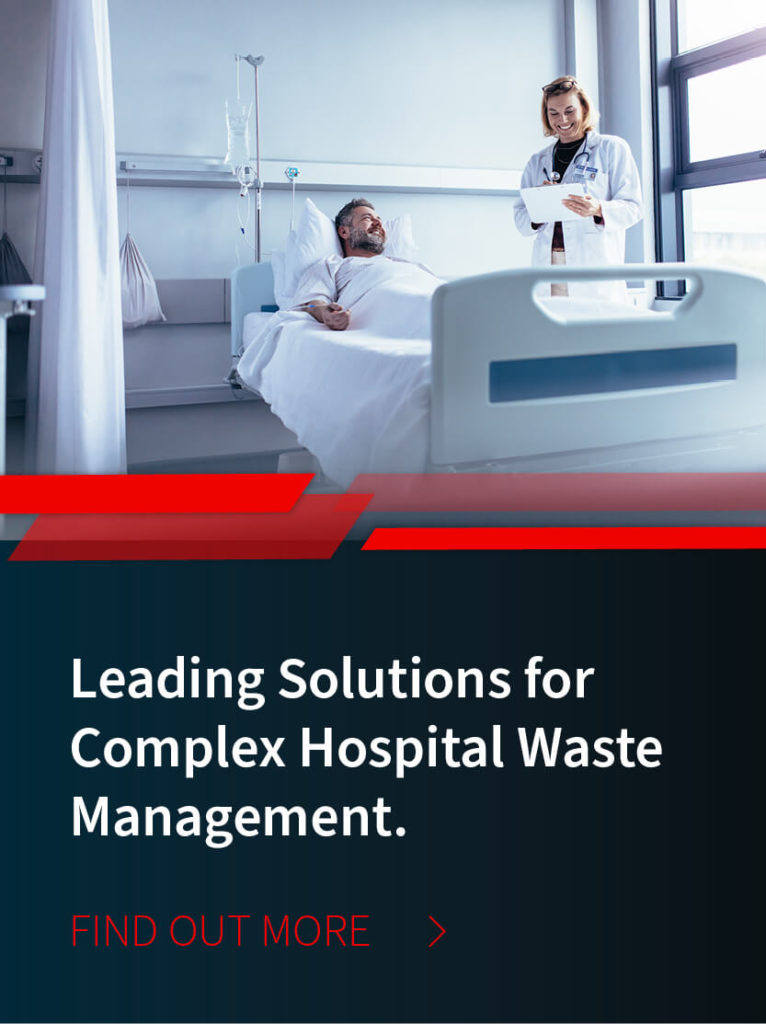
/ IN THIS BLOG
Expired medications in red bag waste? We won’t beat around the bush. The short answer is simply no, don’t put expired meds in red bags. Although it’s a simple answer to the question, there’s a lot more information that’s relevant to understand what red bag waste actually includes and how expired medications should be handled.
As tempting as it may be, expired medications should never be disposed of in
Expired medications in red bag waste? We won’t beat around the bush. The short answer is simply no, don’t put expired meds in red bags. Although it’s a simple answer to the question, there’s a lot more information that’s relevant to understand what red bag waste actually includes and how expired medications should be handled.
As tempting as it may be, expired medications should never be disposed of in red bag waste. The practice may seem convenient or even harmless, but it violates federal regulations and can expose healthcare facilities to significant compliance risks, safety hazards, and financial penalties.
Confusion around pharmaceutical waste disposal is common in hospitals, clinics, and medical offices. Multiple waste streams, including sharps, biohazardous materials, hazardous pharmaceuticals, and non-hazardous drugs, all require different handling and disposal methods. Misclassifying any of these can result in improper treatment, environmental harm, or even costly violations under the Resource Conservation and Recovery Act (RCRA).
So now that you know what not to do with expired meds, it’s also a good idea to understand what practical steps to take at your facility to ensure your team remains compliant.
01 / What Is Red Bag Waste?
Red bag waste, which is officially known as regulated medical waste, is designated for items contaminated with blood or other potentially infectious materials. It’s a specific waste stream that must be handled carefully to prevent the spread of pathogens. This protects not only waste handlers, but also staff and the general public. Common examples of red bag waste include::
Blood-soaked gauze and dressings
Used gloves, gowns, and other PPE
IV tubing with visible blood
Surgical sponges and drapes
Sharps containers (though these must be rigid and puncture-resistant)
What red bag waste does not include are pharmaceuticals (expired or otherwise). Even if a medication came from a patient treatment area or was opened but unused, it should not be disposed of in a red biohazard bag.
You might be wondering why medications can’t go into these bags. If red bags are already used for contaminated materials, what’s the harm in adding pharmaceuticals to the mix? The issue is twofold. First, the Resource Conservation and Recovery Act (RCRA) classifies many medications as hazardous waste, and mixing them with biomedical waste violates disposal laws, can trigger fines, and creates serious downstream handling issues. Second, improperly discarded medications can be tampered with or diverted, creating security gaps within your facility and increasing the risk of drug misuse or abuse. That’s why there are specific rules which need to be consistently followed.
02 / How Should Expired Medications Be Disposed Of?
Expired medications require their own dedicated waste stream and red bags are not part of that process. Proper pharmaceutical waste disposal starts with identifying whether a medication is considered hazardous under federal law.
The Resource Conservation and Recovery Act (RCRA) classifies certain expired or unused drugs as hazardous waste based on chemical composition and toxicity. These include medications that are:
Ignitable (flammable alcohol-based solutions)
Toxic (like warfarin or epinephrine)
Reactive or corrosive
Listed on RCRA’s P- or U-lists of hazardous pharmaceuticals
Even drugs that are not RCRA hazardous may still need to be collected separately under your state’s pharmaceutical waste rules. That’s where Subpart P comes in.
Subpart P is a federal regulatory framework specifically for healthcare facilities managing hazardous pharmaceutical waste. It outlines how hospitals, clinics, and pharmacies must handle, store, and dispose of this material, including restrictions on sewering, container requirements, and simplified collection protocols.
In short, expired meds should be:
Segregated from biomedical waste
Placed in properly labeled pharmaceutical waste containers
Managed according to RCRA and Subpart P guidelines
Disposed of through a licensed pharmaceutical waste handler
Following these steps ensures compliance and reduces your facility’s environmental liability. These rules are also an important step in ensuring the safety of your staff and patients.
03 / What are Common Reasons for Improper Pharmaceutical Waste Disposal?
Despite clear regulations, expired medications still frequently end up in red bag waste or general trash. Usually this is due to confusion rather than negligence on the part of staff members. Some of the most common reasons this mistake happen include:
Lack of staff training: Without routine education on current disposal protocols, it’s easy for staff to default to red bags or other familiar waste bins.
Misunderstanding what counts as “hazardous”: Many assume expired automatically means harmless, but some drugs remain chemically potent and are regulated long after expiration.
Inconsistent waste segregation practices: In fast-paced clinical settings, waste sorting can fall through the cracks if containers aren’t clearly labeled or conveniently located.
Assumption that red bag disposal is a catch-all: Because red bags are already considered “regulated,” some assume they can safely hold any regulated material, which of course, is not the case.
Limited enforcement or oversight: In regions where oversight has historically been light, disposal shortcuts can become routine. Change sometimes doesn’t occur until enforcement catches up.
Avoiding these pitfalls starts with awareness and proper training. By creating and following clearly defined workflows for each type of waste, staff can easily remain on the same page at all times.
04 / What are the Best Practices for Hospitals and Clinics
Working to make certain that expired medications are handled correctly is a way of working, not a single action. To stay compliant with pharmaceutical waste regulations, facilities need to take a proactive approach. At MCF Environmental Services, we often advise and guide healthcare facilities through the process of improving medication handling and disposal. Here are six best practices every facility should put in place:
Conduct regular staff training. Make pharmaceutical waste disposal part of the standard onboarding and continuing education processes. Reinforce protocols often to account for staff turnover and changing regulations.
Clearly label all waste containers. Use color-coded or prominently labeled containers for pharmaceuticals, sharps, red bag waste, and hazardous materials to reduce confusion during busy shifts.
Keep containers in accessible, logical locations.Convenience placement is a major part of compliance practicality. Think about typical workflows and then place pharmaceutical waste containers wherever medications are prepared or administered. This will encourage proper disposal at the point of use.
Review and follow Subpart P guidelines. Ensure your facility understands its obligations under Subpart P, including restrictions on sewer disposal and proper management of RCRA-listed pharmaceuticals.
Perform routine internal audits. Spot check waste segregation procedures and disposal records to identify issues before they result in regulatory violations.
Partner with a licensed, experienced waste provider.Work with a company licensed to manage both pharmaceutical and biomedical waste streams. This simplifies logistics and reduces risk.
05 / MCF Helps Healthcare Facilities with Expired Medication Disposal
Keeping compliant with the complexities of pharmaceutical and biomedical waste disposal is no easy task, especially in the often fast-paced environments of healthcare settings. But with the right practical strategies, it is possible. Partnering with an experienced waste management provider that has healthcare industry know-how can be the catalyst to positive change. MCF Environmental Services works with hospitals, clinics and other healthcare facilities to give organizations the guidance and benefit of our deep understanding of evolving regulations like RCRA and Subpart P. We make sure your facility remains compliant, with cost-effective waste management options designed to fit your unique needs.
Whether your facility needs a full compliance audit, updated training protocols, or a streamlined system for handling both red bag and pharmaceutical waste, MCF delivers reliable, customized support. Get in touch today to protect your team and stay compliant with a simplified approach to medication disposal.
06 / Frequently Asked Questions
Can I dispose of expired medications in red bag waste if they were never opened?
Even unopened or unused medications must be handled through pharmaceutical waste channels, not red bags. Remember, red bag waste is only for biohazardous materials.
What is Subpart P and does it apply to my facility?
Subpart P is a set of RCRA regulations specific to healthcare settings that manage hazardous pharmaceuticals. It applies to most hospitals, clinics, and pharmacies.
Do non-hazardous medications have to be separated too?
Yes. Even medications not classified as hazardous under RCRA should be collected separately and never mixed with biomedical waste or general trash.
Robert Losurdo
President, COO








